- Home
- Michael Buckley
Tales From the Hood Page 19
Tales From the Hood Read online
Page 19
She went to bed, but without Daphne the room seemed huge and lonely. She tossed and turned, and though she was exhausted she couldn’t sleep. After a while she decided to visit her parents. She opened the door and found them there, still soundly slumbering on the queen-size bed. She crawled in between them and closed her eyes. She heard Mirror clear his throat and knew his face had appeared in the reflection.
“Want to see where Goldilocks is?” he asked.
Sabrina fought back a tear. “No, we’re done looking. She doesn’t want to come back. Not that I can blame her really. If I could get out of this town I might never come back.”
“I know exactly how you feel, Starfish,” Mirror said.
Sabrina watched his face disappear. She reached over and kissed her father on the cheek, then did the same to her mother. Her kisses weren’t magical. They wouldn’t wake Henry and Veronica. But maybe they made a difference to her parents. They certainly made a difference to her. She closed her eyes and drifted to sleep.
Sometime in the night, Sabrina heard a knock on the door downstairs. She climbed out of bed and went down the steps, wondering who could be visiting at such a late hour. Perhaps it was Puck. He was known to forget his keys. Or maybe Red had decided to have a look around and had gotten locked out.
She reached for the doorknob with one hand and rubbed the sleep out of her eyes with the other. When she opened the door she gaped at what she saw. There were three enormous brown bears on the porch, one in a hat and tie, a second in a purple polka-dotted dress, and the third in a Cleveland Indians baseball cap. Two of the bears stood nearly eight feet tall, while the smallest was just a few inches over Sabrina’s height.
Then a fourth person pushed her way to the front. She had freckles across her nose, a bronzed tan, big green eyes, and blond curls the color of precious metal.
“Goldilocks?” Sabrina gasped.
The woman nodded. “Sorry I’m late. I had to pick up a few friends. This town is dangerous, you know.” Goldilocks smiled. “So, I hear someone in this house needs a kiss.”
Michael Buckley is the New York Times bestselling author of the Sisters Grimm and NERDS series. He has also written and developed television shows for many networks. Michael lives in Brooklyn, New York, with his wife, Alison, and his son, Finn.
This book was designed by Melissa Arnst, and art directed by Chad W. Beckerman. It is set in Adobe Garamond, a typeface that is based on those created in the sixteenth century by Claude Garamond. Garamond modeled his typefaces on those created by Venetian printers at the end of the fifteenth century. The modern version used in this book was designed by Robert Slimbach, who studied Garamond’s historic typefaces at the Plantin-Moretus Museum in Antwerp, Belgium.
The capital letters at the beginning of each chapter are set in Daylilies, designed by Judith Sutcliffe. She created the typeface by decorating Goudy Old Style capitals with lilies.
Enjoy this sneak peek at
“This has been a stupid wild-goose chase!” Sabrina exclaimed. “The Master and the Scarlet Hand are probably getting a big laugh out of this right now!”
“Don’t give up hope, Starfish,” Mirror said.
“Give up hope! I haven’t had any hope in two years.”
“Bummer!” Puck said. “Well, maybe whoever is pounding on the door downstairs can wake your dad up.”
“Puck, could you answer it for me?” Granny asked.
“What am I? The butler?”
“I’ll get it,” Sabrina said. She needed to get out of the room. The disappointment was hanging in the air, threatening to suffocate her.
“Freaking out isn’t helping Mom and Dad,” Daphne said as she raced down the stairs after Sabrina. “Exploding in frustration every time we have a setback is, well, annoying.”
Sabrina marched to the door the turned to face her sister. “First of all, you don’t even know the meaning of most of the words in that last sentence. I’ll be angry and upset if I want. I have a right to be angry. My life is horrible.”
Sabrina threw the door open and there, standing on the porch, was a rail-thin woman with a hooked beak of a nose and eyes like tiny black holes. She was dressed entirely in gray. Her handbag was gray. Her hair was gray. When she smiled, her teeth were gray.
“I think it’s about to get a lot worse,” Daphne groaned.
“Hello, girls,” the woman said.
“Ms. Smirt!” Sabrina cried.
“Oh, you remember me. How it warms the heart,” she said as she snatched them by the wrists and dragged them out of the house and across the lawn, where a taxicab was waiting in the driveway.
“Where are you taking us?” Daphne cried, trying and failing to break free from the woman’s iron talons.
“Back to the orphanage,” Smirt snapped. “You don’t belong here. Your grandmother is unfit. She kidnapped you from your foster father.”
Sabrina remembered the last foster father Smirt had sent them to live with. Mr. Greeley was a certifiable lunatic. “He was a serial killer. He attacked us with a crowbar.”
“The father-child bond needs time to develop,” Smirt said as she pushed the girls into the backseat of the taxi.
“You can’t send us back to him,” Daphne shouted.
“Sadly, you are correct. Mr. Greely is unavailable to take you back due to an unfortunate incarceration. But don’t worry. I’ve already found you a new foster family. The father is an amateur knife thrower. He’s eager for some new targets . . . I mean, daughters.”
Smirt slammed the cab’s door shut. She tossed a twenty-dollar bill at the driver. “You got automatic locks on this thing?”
Suddenly, the locks on the doors were set.
“To the train station, please,” Smirt said. “And there’s another twenty in it if you can make the 8:14 to Grand Central.”
The taxi charged out of the driveway and tires squealed as it made a beeline toward the Ferryport Landing train station.
“You can’t take us back to the orphanage,” Sabrina said. “We’re not orphans anymore. We found our mother and father.”
“Such an imagination you have, Sophie,” Smirt said. “There’s really nothing as unattractive in a child as an imagination.”
“My name is Sabrina!”
In no time, the taxi was pulling into the train station. Ms. Smirt pinched the girls on their shoulders and hustled them onto the waiting train. The doors closed before Sabrina and Daphne could make a run for it.
“Find a seat, girls,” she said as the train rolled out of the station.
“Daphne, don’t worry,” Sabrina whispered as she took her sister’s hand and helped her into a seat. Sabrina had many talents, but her greatest was the ability to devise effective escape plans. While she comforted her sister she studied the exit doors, windows, and even the emergency brake. A daring escape was already coming together when she noticed the complete lack of worry on her little sister’s face.
“I’ve got this one covered,” Daphne said.
“You what?” Sabrina asked.
The little girl put her palm into her mouth and bit down on it.
“What’s going on, Daphne?” Sabrina continued, eyeing the girl suspiciously. Daphne had never plotted an escape. Escaping had been the exclusive domain of Sabrina Grimm for almost two years. What did her little sister have in mind?
“Zip it!” Ms. Smirt snapped before Daphne could explain. “I don’t want to have to sit on this train for two hours with a couple of chatterboxes.” The caseworker snatched a book out of her handbag and flipped it open. Sabrina peered at the title: The Secret.
“Ms. Smirt, have you ever heard of the Brothers Grimm?” Daphne said.
The caseworker scowled and set her book on her lap. “What do you want?”
“I was wondering if you have ever heard of the Brothers Grimm.”
“They wrote the fairy tales,” Ms. Smirt said.
Daphne shook her head. “That’s what most people believe, but it’s not true. The Brothers Grimm
didn’t write stories—they wrote down things that really happened. The fairy tales aren’t made-up stories. They’re warnings to the world about Everafters.”
Sabrina was stunned. Daphne was spilling the family’s secret to the worst possible person. They couldn’t trust Smirt any further than they could throw her.
“What’s an Everafter?” the caseworker snapped.
“It’s what fairy-tale characters like to be called,” the little girl explained. “‘Fairy-tale character’ is kind of a rude term. Like I was saying, the Brothers Grimm wrote about Everafters because they are real. Take Snow White. She’s a real person and the story really happened—poison apple and all. Cinderella, Prince Charming, Beauty and the Beast, Robin Hood—they’re all real people. They actually live here in Ferryport Landing. The Queen of Hearts is the mayor. Sleeping Beauty is dating our uncle.”
“Debbie, you are going to look so adorable in your straitjacket,” Ms. Smirt said.
“It’s Daphne,” the little girl said.
“Please be quiet,” Sabrina whispered into her sister’s ear.
“OK, kid, I’ll bite. So, if fairy-tale characters are real, how come I haven’t met any?” the caseworker said with a cackle.
“Because there’s a magical barrier that surrounds this town that keeps the Everafters inside. Our great-great-great-great-grandfather Wilhelm Grimm and a witch named Baba Yaga built it to stop some evil Everafters from invading nearby towns.”
“Oh, of course,” Smirt said sarcastically. She slapped her knee and let out a ghastly laugh that sounded like a wounded moose. Sabrina had never seen the nasty woman laugh before and hoped she never would again.
Daphne ignored Smirt. “The barrier has made people in the town angry, and a lot of the Everafters don’t like us much,” Daphne said. “But—”
“Daphne, stop. You’ve told her too much,” Sabrina begged.
“Let me finish, Sabrina,” Daphne said calmly. “Like I was saying, we have a lot of enemies in Ferryport Landing. but we’ve managed to make a few friends.”
Suddenly there was a tap on the window. Sabrina gazed out, expecting to see the Hudson River rushing past. Instead, what she saw nearly caused her to fall out of her seat. In the window was a familiar ragged-haired boy in cowboys-fighting-monkeys pajamas. Held aloft by two giant pink insect wings, he soared alongside the speeding train, grinning and sticking his tongue out at her. Sabrina had never been so happy to get a raspberry in her life.
To be continued. . .

 Raging Sea
Raging Sea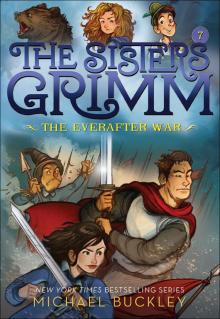 The Everafter War
The Everafter War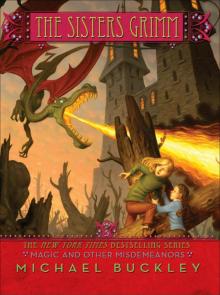 Magic and Other Misdemeanors
Magic and Other Misdemeanors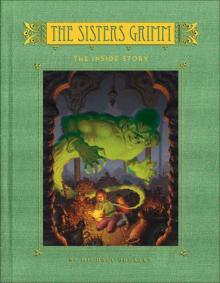 The Inside Story
The Inside Story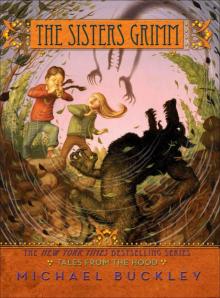 Tales From the Hood
Tales From the Hood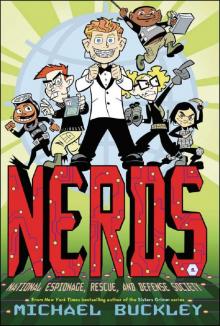 NERDS: National Espionage, Rescue, and Defense Society
NERDS: National Espionage, Rescue, and Defense Society Undertow
Undertow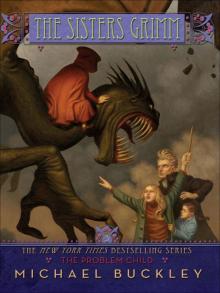 The Problem Child
The Problem Child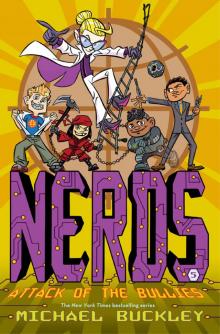 Attack of the BULLIES
Attack of the BULLIES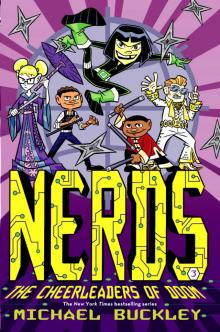 The Cheerleaders of Doom
The Cheerleaders of Doom Heart of the Storm
Heart of the Storm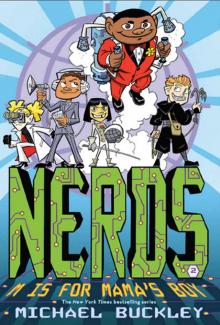 M Is for Mama's Boy
M Is for Mama's Boy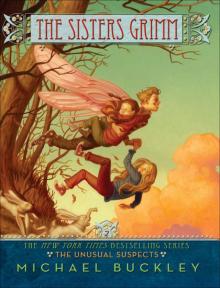 The Unusual Suspects
The Unusual Suspects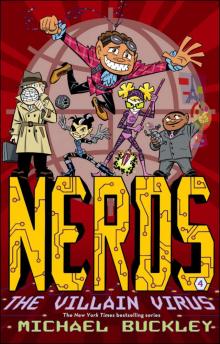 The Villain Virus
The Villain Virus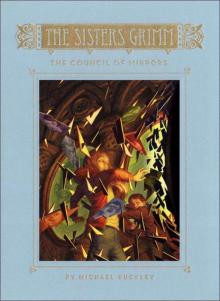 The Fairy-Tale Detectives
The Fairy-Tale Detectives The Unexpected Has Happened
The Unexpected Has Happened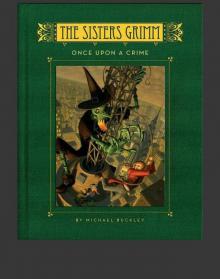 Once Upon a Crime (The Sisters Grimm, Book 4)
Once Upon a Crime (The Sisters Grimm, Book 4)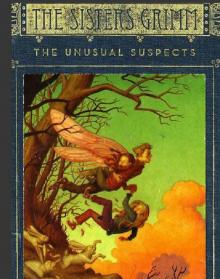 The Unusual Suspects (The Sisters Grimm, Book 2)
The Unusual Suspects (The Sisters Grimm, Book 2)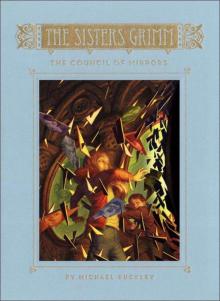 The Sisters Grimm: Book Nine: The Council of Mirrors (Sisters Grimm, The)
The Sisters Grimm: Book Nine: The Council of Mirrors (Sisters Grimm, The)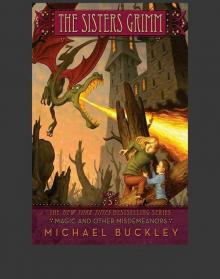 Magic and Other Misdemeanors (The Sisters Grimm, Book 5)
Magic and Other Misdemeanors (The Sisters Grimm, Book 5)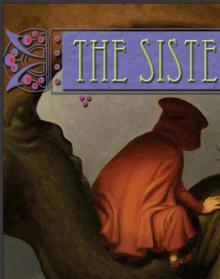 The Problem Child (The Sisters Grimm, Book 3)
The Problem Child (The Sisters Grimm, Book 3)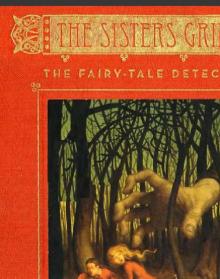 The Fairy-Tale Detectives (The Sisters Grimm, Book 1)
The Fairy-Tale Detectives (The Sisters Grimm, Book 1)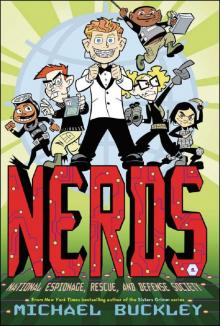 National Espionage, Rescue, and Defense Society
National Espionage, Rescue, and Defense Society